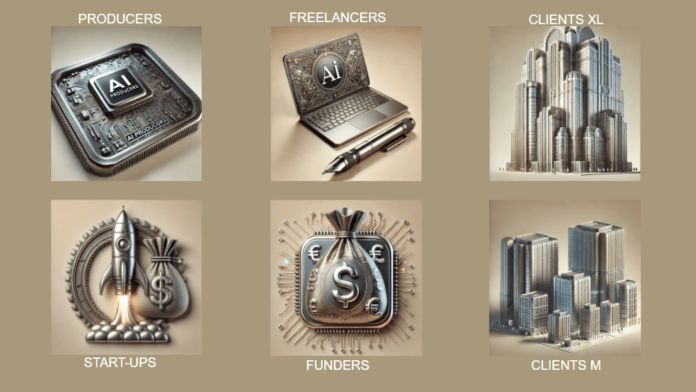By Luca Collina
AI is swiftly transforming the world, thus unveiling thrilling chances but at the same time provoking anxiety regarding an “AI bubble.” There is a concern that, just like the ’90s dot com crash, the present explosion of artificial intelligence could result in overpriced assets immediately followed by rapid nosedives. On a broader global scale, such a crash would substantially impact producers, startups, contractors, and commercial enterprises from America to the UK and Europe.
I want to fully consider the stakeholders of this AI ecosystem to undergeneralize the concept/buzzword of “bubble”. In addition, I will use a smart icon instead of characters to reduce the negative feelings about.
Who are the stakeholders?
We have considered the US, UK, and Europe to see where and how the could come out
- In this first part, we analyse the AI producers’ strategic behaviour
- Second part: Investigating the AI Surge: Potential Impacts on Investors, Startups, and Freelancers
- Third final part: AI Bubble Ripples: Assessing Consequences for Large and Medium Enterprises
US
Several factors have arguably left the US more exposed to a potential because of speculative investment and fast growth, ultimately leading to overvaluations.
There has been a massive injection of funding into startups dealing with AI in addition to established players within this industry. Now, hyperinflated entities emerge, which may make it hard to meet investors’ expectations of return.1
Markets Monopolisation
The US AI market is dominated by Google, Amazon as well as Microsoft where just a few companies have the most power. The course of the market could change significantly if something were to disrupt Google, Amazon or Microsoft, which might cause traders not to have faith in them though they lead in terms of innovation as far as Al.,2 Moreover, these giants’ changing shapes will impact the market.3
Products market destination
The United States is where most innovations concerning artificial intelligence (AI) originate, especially in B2C and AI-driven advertisement 4. Such developments depend more on public taste, making them more unpredictable compared to deliberately set ones for industrial needs or businesses, which may remain stable over time.5
Regulations
US regulation on AI is less strict, and therefore there is quick development but also risk because there are fewer precautions in place. This can lead to promises that cannot be kept as they may look improbable at best when they hit their highs leading ultimately to disappointment and very little progress in absolute terms.
When all factors are combined, such as speed investing, mono markets, consumer- oriented AI technologies, and very expensive stocks alongside weaker rules and regulations, America is more prone to experiencing an AI compared with other locations that take cautious approaches in their regulatory framework.
United Kingdom
Some companies in the UK specialize in AI development. They are working on incorporating AI technology into various fields such as health, finance and manufacturing with realizable benefits (DeepMind, a subsidiary of Alphabet/Google; Faculty; Babylon Health). This is in contrast with the rest of the world where most investments have been speculative leading to collapse later on.
Observing the participants in the UK’s AI industry, it is evident that they are doing the best thing by being cautious. Their concern is that any failure in AI programming will hurt every British company too much to proceed operating effectively. Yet, despite all fears and warnings about them, England has been so unique when it comes down regulating Artificial Intelligence as well as developing them unlike other countries.
In some ways, AI is gradually finding ways into traditional areas within the UK. This helps the sector to grow due to the lack of too much guessing (Bowles et al., 2017)6. Many organizations within the United Kingdom primarily concentrate on making AI applicable, particularly in health, financial technology and manufacturing sectors. This behaviour is different from careless investments in other regions7.
The legal framework which surrounds AI in Britain may not be still defined but it has been crafted with an eye on ensuring that AI should be safe, fair and transparent. The ongoing debate about AI safety at Bletchley Park‚8 involving policymakers and industry actors indicates the need for a balanced approach between innovation and responsible regulation in the UK.
Europe
French AI companies adopt strategies suitable for their countries’ specialization in these sectors to evade involvement in the in AI. France has declared itself Europe’s number one in research and development of artificial intelligence by pouring money into AI projects in public health and military departments. To this end, collaborations among academia, industry, and startups have been encouraged by the government of France to enhance innovative efforts and, at the same time, consider ethical considerations as well as regulatory frameworks in designing AI9.
Germany has concentrated more on the application of AI in industrial automation and manufacturing, exploiting the background of the country in industry. In Germany, the move towards “Industrie 4” depends on investment in AI embedded in production processes, which will render them more efficient or resilient altogether10.
Strong encouragement of embryonic alliances between Berlin and Paris has been provided via the Aachen Treaty for coping with crises as well as ensuring commercial sustainability11 12.
Similarly, Germany has seen the numbers rise for grown startups concentrating on artificial intelligence across various fields within both countries. They experienced progress within short periods due to significant capital infusion finalised to real results.
They risk less from AI’s since they relate practical outcomes, and they deliver within their operations with industry operational efficiency13. Speculative over rallies cannot affect them since they are valued based on real performance rather than mere hype, as witnessed in other domains and countries.
Other parts of Europe are also experiencing a rise in the number of grown AI startups (green technologies and sustainability, agriculture and tourism) in Southern Europe with a focus on efficiency and practicality. Focusing on the traditional economy is how they avoid being carried away by speculative.
Summing up
Market Concentration
The sector of AI in Europe and Britain is more varied as opposed to the United States. Although it has big players such as DeepMind or Siemens, there isn’t domination by just a handful of large technology firms. Many small start-ups are oriented towards the manufacturing industry which lessens dependence upon one firm. Multinational collaborations like that between France and Germany encourage steady progress and innovation across all sectors thereby promoting growth without being reliant on only a few companies.
Focus on B2B AI Products
The emphasis in Europe, and in some parts of the UK, is more on AI’s industrial and business usage rather than in the US where it is concentrated more on products targeted at each individual consumer. For instance, Germany has put its investments into Artificial Intelligence for manufacturing and automation as one of its strategies for “Industrie 4.”; whereas France is concentrating on application into health care systems, military purposes and public administration. This focus on B2B applications mitigates against exposure to the wave-like tendencies of customer markets which might cause rapid changes thereby providing relatively steady revenue-gain perspectives and safeguarding against inflation that may occur at one point or another.
Regulatory Oversight
Europe, including the UK, has a more robust regulatory framework for AI. The European Union has been proactive in creating regulations that address ethical AI use, data privacy and transparency. This regulatory oversight helps to ensure that AI developments are more carefully monitored and aligned with societal and ethical goals14.
In conclusion, compared to the US, Europe and the UK are generally safer from the threat of an AI bubble. This is due to their use of AI in industries that can be sustained and investments that are slow and careful; diversified markets increase their immunity to a fast rate of growth and possible overvaluation always observed in the US. In this way, they can curb any speculative risks better than their counterparts who are based in the US.
The photo in the article is provided by the company(s) mentioned in the article and is used with permission.
About the Author
 Luca Collina’s background is as a management consultant He has managed transformational projects, also at the international level (Tunisia, China, Malaysia, Russia). He now helps companies understand how GEN-AI technology impacts business, use technology wisely, and avoid problems. He has an MBA in Consulting, has received academic awards, and was recently nominated for Awards 2024 by the Centre of Management Consultants for Excellence. He is a published author. Thinkers360 named him one of the Top Voices, Globally and in EMEA in 2023, and currently is among the 10# thought leaders in Gen-AI and 1# in Business continuity. Luca continuously upgrades his knowledge with experience and research to transfer it. He is ready to launch the interactive courses on “AI & Business” In September 2024.
Luca Collina’s background is as a management consultant He has managed transformational projects, also at the international level (Tunisia, China, Malaysia, Russia). He now helps companies understand how GEN-AI technology impacts business, use technology wisely, and avoid problems. He has an MBA in Consulting, has received academic awards, and was recently nominated for Awards 2024 by the Centre of Management Consultants for Excellence. He is a published author. Thinkers360 named him one of the Top Voices, Globally and in EMEA in 2023, and currently is among the 10# thought leaders in Gen-AI and 1# in Business continuity. Luca continuously upgrades his knowledge with experience and research to transfer it. He is ready to launch the interactive courses on “AI & Business” In September 2024.
References
- https://www.trustnet.com/news/13404483/theres-no-bubble-why-comparisons-between-the-dot-com boom-and-ai-are-wrong
- See previous footnote
- https://www.forbes.com.au/news/innovation/decoding-2024-experts-unravel-ais-next-big-phase/ 1
- https://www.pmg.com/insights/advertising-in-2024
- https://www.mobileworldlive.com/google/analysis-google-amazon-microsoft-fight-for-ai-dominance/
- Bowles, S., Edwards, R. and Roosevelt, F. (2017). Understanding Capitalism: Competition, Command, and Change. 4th ed. Oxford: Oxford University Press
- https://sternstrategy.com/news/the-ai-bubble-avoid-falling-for-the-hype/
- https://www.gov.uk/government/publications/ai-safety-summit-2023-the-bletchley-declaration
- https://aimagazine.com/articles/france-positions-itself-to-become-europes-ai-hub
- https://www.omrglobal.com/industry-reports/germany-ai-in-manufacturing-market
- https://www.de-hub.de/en/blog/post/how-germany-and-france-foster-collaborative-innovation-in-ai/
- https://www.bpifrance.com/2021/03/25/call-for-projects-between-france-and-germany-on-artificial intelligence-technologies/
- https://aimagazine.com/articles/france-positions-itself-to-become-europes-ai-hub
- https://www.ox.ac.uk/news/2023-11-01-risks-regulation-opportunities-too-ai-thriving-uk-say-experts




































































